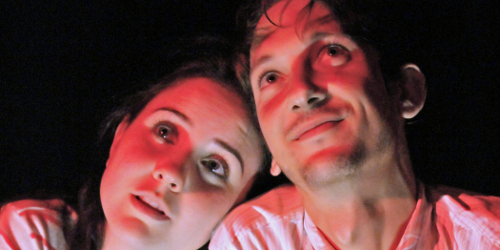By John Quinn

Harper (Meredith Deighton) and Prior (Bailey Boudreau) share a close moment together in The Ringwald Theatre's production of Tony Kushner's two-part masterpiece, "Angels in America." Photo: Brandy Joe Plambeck.
"Putting the cart before the horse" is a familiar old saw. It describes reversing "the accepted or logical order of things." The Critic finds himself reviewing The Ringwald Theatre's production of "Angels in America, Part One" after reviewing Part Two last weekend. So have I emerged "bewitched, bothered and bewildered?" That would be a "no" on all three counts – "entranced" is a better description of my experience than "bewitched."
Just to bring you up to speed: "Angels in America" is an epic drama crafted by playwright Tony Kushner. It's set in 1985, when the grim reality of AIDS finally began working its way into the national conscience. The play runs over six hours; thus it is divided into two parts, subtitled "Millennium Approaches "and "Perestroika." The current production of Part One is a revival of last season's successful rendition. That show is nominated for the Wilde Award for Best Drama. Also nominated is Travis Reiff for Best Actor in a Drama. The difference between February and September is that Dennis Kleinsmith has assumed Reiff's role and quite ably, if I might add. The rest of the original cast reprise their roles.
Consider the failing relationships of two couples. Louis (Matthew Turner Shelton) and Prior (Bailey Boudreau) have been together four and a half years when Prior reveals he has AIDS. His condition rapidly deteriorates, and Louis, breaking under the strain, abandons him. The second couple, staunch Mormons Joe and Harper Pitt (Brenton Herwat and Meredith Deighton), are already drifting apart. Joe is gay but in denial; Harper compensates for the lack of intimacy with heavy dosages of Valium.
Let the weaving of plots begin! Louis is a "word processor" at the U.S. Court of Appeals, Second Circuit, where Joe is a law clerk. Joe encounters Louis sobbing in the men's room, and they begin an unlikely acquaintance. We're soon introduced to Joe's mentor and "friend," Roy Cohn, the McCarthy-era legal bully. The self-aggrandizing Cohn is also in denial. Given a diagnosis of HIV infection, he claims men with his "clout" wouldn't get a disease associated with gay men; rather, he has liver cancer.
It is not disparaging to say that Part Two is more "interesting" than Part One. It's the difference between exposition and resolution. Part One provides a much richer sense of character and is significant in appreciating how the characters evolve. Deighton and Boudreau's dexterity in portraying their characters diminishing grip on reality is remarkable, as is Shelton's careful balance between fear and guilt. Kleinsmith appears to have moved seamlessly into his role, bringing out the brash, crass nature of the venal Roy Cohn, yet keeping the character "forgivable."
Forgivable, but not forgettable. In Kushner's view, there's a distinction. Although Part One is full of "reassuringly incomprehensible" rhetoric, largely political, ultimately the prevailing theme of the entire drama is the potential for forgiveness. Although "Angels in America" is 20 years old, it will never be out of date.
Can the discriminating theater patron see Part One or Part Two alone? In theory, yes; "half a loaf is better than none." But to truly appreciate the scope of Kushner's vision you really owe it to yourself to see both. After all, "The whole is greater than the sum of its parts."
REVIEW:
'Angels in America, Part One: Millennium Approaches'
The Ringwald Theatre
22742 Woodward Ave., Ferndale
8 p.m. Friday, Sept. 19, 26
3 p.m. Saturday, Sept. 27
2 hours, 55 minutes (with two intermissions)
$15-20
248-545-5545
http://www.theringwald.com










